In the streets, on social media, and in quiet conversations, the phrase “May Nigeria not happen to you” has become a grim prayer. It reflects the collective frustration of a people resigned to systemic failure, where the very institutions meant to protect and serve them often become sources of pain and despair. Few sectors embody this stark reality as glaringly as Nigeria’s healthcare system.
For many Nigerians, seeking medical care is a gamble—a roll of the dice where outcomes can range from miraculous recovery to unspeakable tragedy. Despite the existence of a Patient Bill of Rights, countless citizens are subjected to substandard care, negligence, and outright malpractice. Worse still, when things go wrong, they find themselves facing a wall of institutional indifference, with little to no recourse for justice or accountability.
The Medical and Dental Council of Nigeria (MDCN), the body tasked with regulating medical practitioners and safeguarding the public from malpractice, has been woefully ineffective.
Instances abound of doctors who, after grievous errors, remain shielded by bureaucratic inertia or outright complicity. Hospitals are known to deny patients access to their medical records, falsify reports, and frustrate families seeking justice. Yet, the MDCN’s interventions remain sporadic at best, and opaque or absent at worst.
Consider the tragic case of Peju Ugboma, a mother of two who died due to negligence at a hospital in Lagos. Investigations revealed lapses in care and lack of readiness for emergencies, yet the family’s quest for accountability has met with delays and silence. Similarly, reports of women disabled during childbirth, as highlighted in recent investigations by Punch, underscore the appalling neglect of maternal health. These are not isolated incidents—they are the tragic consequences of a broken system.
In a functional society, institutions like the MDCN and the Nigerian Medical Association (NMA) would act as ombudsmen, enforcing ethical standards and ensuring erring doctors and hospitals face consequences. Yet, the silence of these bodies is deafening. The absence of a transparent process for investigating malpractice cases and enforcing penalties only emboldens those who cut corners, falsify records, and prioritise profit over patient welfare.
This lack of accountability raises a critical question: What hope is there for the average Nigerian when the guardians of healthcare standards fail? How can trust be restored in a system that appears designed to protect institutions rather than patients?
To salvage the healthcare sector, urgent reforms are necessary. The MDCN must shed its inefficacy and take its regulatory role seriously, ensuring that doctors and hospitals adhere to global best practices. Government must also fund and enforce the Patient Bill of Rights, creating mechanisms for whistleblowing, independent investigations, and legal redress for victims of malpractice.
Nigeria must decide whether it will continue to tolerate a system where negligence is swept under the rug and lives are treated as expendable. Until these reforms are enacted, the phrase “May Nigeria not happen to you” will remain a damning indictment of a country that has failed its people in their most vulnerable moments. The time for change is now.
Davies is a public affairs analyst. He wrote from Lagos.






